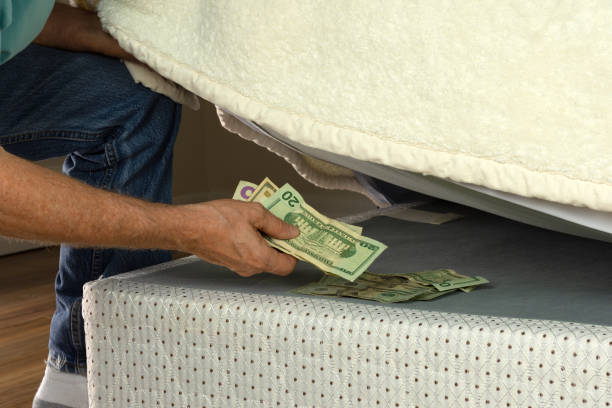If you’re looking to save money, hiding cash in a safe place might seem like a good idea. After all, you won’t be tempted to spend it if you don’t see it, right? Unfortunately, this strategy is not as effective as it may seem. In fact, it can actually be a huge mistake.
This article will give you reasons why hiding money in a safe place is a poor savings strategy.
Security Risks of Keeping Cash in a Safe
Keeping cash stashed away in a safe may seem like a good way to save money, but it poses several security risks that you need to consider. In this section, we will discuss some of the major risks associated with keeping cash in a safe.
Risk of Theft
One of the most significant risks of keeping cash in a safe is the risk of theft. Even if you have a high-quality safe with advanced security features, there is always a chance that someone may break into your home and steal your cash.
In fact, having a safe in your home may make you a more attractive target for thieves, as they may assume that you have valuable items stored inside.
Furthermore, if you keep a large amount of cash in your safe, you may be tempted to tell others about it, which can increase the risk of theft. It is essential to keep the existence of your safe and the amount of cash you have in it a secret from others.
Risk of Fire or Natural Disasters
Another significant risk of keeping cash in a safe is the risk of fire or natural disasters. If your home catches fire or is hit by a natural disaster such as a flood or earthquake, your safe may not be able to protect your cash.
In fact, it may even make things worse, as the safe may become damaged, making it difficult or impossible to access your cash.
It is crucial to keep your cash in a safe place that is not only secure but also protected from natural disasters. A bank or credit union is an excellent option for storing your cash, as they typically have advanced security measures in place and are protected from natural disasters.
Overall, keeping cash in a safe may seem like a good idea, but it poses several security risks that you need to consider. To ensure the safety of your money, it is best to store it in a secure location such as a bank or credit union.
Inflation and Depreciation
Here’s another reason why it is a bad idea to simply hide money in a safe place as a way to save? The answer is simple: your money will lose value over time through inflation
The cost of goods and services tends to go up over time, which means that the same amount of money will buy you less in the future than it does today. By simply hiding your money, you’re not giving it the opportunity to grow and keep pace with inflation.
Effects of Inflation on Cash Savings
When you hide money in a safe place as a way to save, you may think that you are keeping your money safe and secure.
However, over time, the value of your money will decrease due to inflation. Inflation is the general increase in prices of goods and services over time. This means that the same amount of money will buy fewer goods and services in the future than it does today.
For example, if you hide $100 in a safe place today, it may be worth only $90 in a few years due to inflation. This means that the purchasing power of your money has decreased, and you will not be able to buy as much with it as you could before.
Depreciation of Cash over Time
In addition to inflation, cash also depreciates over time. This means that the value of your cash decreases over time due to wear and tear, loss, theft, or other factors. For example, if you hide $100 in a safe place today, it may be worth only $80 in a few years due to depreciation.
Furthermore, if you keep your money in cash, you are not earning any interest on it. This means that you are missing out on potential earnings that you could have made if you had invested your money in other assets such as stocks, bonds, or real estate.
Therefore, it is important to consider the effects of inflation and depreciation when deciding how to save your money. Instead of hiding your money in a safe place, consider investing it in assets that can provide a higher return on investment and protect your money from inflation and depreciation.
Another one of the biggest problems with hiding money at home is that you aren’t earning any interest on your savings. This means that your money is not growing and you’re missing out on potential earnings.
Legal and Tax Implications
Tax-Evasion Risks
Simply hiding money in a safe place as a way to save is not a good idea. It may seem like a smart way to avoid taxes, but it is actually illegal. The Internal Revenue Service (IRS) requires you to report all income, including interest earned on savings accounts, on your tax return. Failure to report this income is considered tax evasion, which is a serious crime that can result in hefty fines and even jail time.
If you are caught hiding money from the IRS, you may face severe penalties, including having to pay back taxes, interest, and penalties. Additionally, the IRS may seize your assets, including your savings account, to satisfy the debt owed.
Legal Consequences of Hiding Money
Hiding money in a safe place can also have legal consequences. If you are involved in a legal dispute, such as a divorce or lawsuit, the court may order you to disclose all of your assets, including any money you have hidden away. Failure to comply with this order can result in serious legal consequences, including fines and even jail time.
Furthermore, hiding money can be seen as an attempt to defraud creditors or other individuals, which is also illegal. If you are caught hiding money, you may face civil or criminal charges, depending on the circumstances.
In addition to the legal and tax implications, hiding money in a safe place is not a smart financial decision. The money will not earn any interest, which means it will lose value over time due to inflation. Instead of hiding money, consider investing it in a diversified portfolio of stocks, bonds, and other assets that can provide long-term growth and income.
Overall, hiding money in a safe place as a way to save is not a good idea. It is illegal, has serious legal and tax consequences, and is not a smart financial decision. Instead, consider investing your money in a diversified portfolio of assets that can provide long-term growth and income.
Alternative Savings Strategies
If hiding your money in a safe place is not a good idea, then what are some alternative savings strategies to consider? Here are a few options:
Investing in Stocks or Bonds
Investing your money in stocks or bonds can be a good way to grow your savings over time. While there is always some risk involved, historically, the stock market has provided higher returns than savings accounts or other low-risk investments. Before investing, it is important to do your research and understand the risks and potential rewards.
Here are some things to consider:
- Do you have a long-term investment horizon?
- What is your risk tolerance?
- What is your investment strategy?
- What are the fees associated with the investment?
Opening a Savings Account
One of the safest and most convenient ways to save money is to open a savings account. Savings accounts are typically offered by banks and credit unions and offer a low-risk way to earn interest on your savings. Most savings accounts are FDIC-insured, which means that your deposits are protected up to $250,000 per depositor, per insured bank, for each account ownership category.
Here are some things to consider:
- What is the interest rate?
- What are the fees associated with the account?
- What are the minimum balance requirements?
- What are the withdrawal restrictions?
Investing in Property or Real Estate
Investing in property or real estate can be a good long-term savings strategy. While it may require a larger initial investment than other options, such as stocks or bonds, it can provide a steady income stream through rental income or appreciation of the property value over time.
Here are some things to consider:
- What is the potential rental income?
- What are the costs associated with owning and maintaining the property?
- What is the potential for appreciation in the property value?
- What are the risks associated with owning property?
A practical example
Let’s say John hid $10,000 in cash in a safe place as a way to save for his child’s college education.
Over time, inflation caused the value of the cash to decrease, and the purchasing power of the money was much less than when it was initially saved.
Unfortunately, John’s house was burglarized, and the safe was stolen, resulting in a complete loss of the savings.
This shows that simply hiding money in a safe place is not a wise long-term strategy as it can lead to loss of value and risk of theft or loss.
Conclusion
Simply hiding money in a safe place may seem like a safe and easy way to save, but it is not a wise long-term strategy. As inflation causes the value of money to decrease over time, the money you have hidden away will lose its purchasing power. Additionally, there is a risk of theft or loss. Rather than hiding money, it is better to invest it or reduce expenses to increase savings. So, it is important to find better ways to save money than just hiding it in a safe place.
YOU SHOULD ALSO READ:











